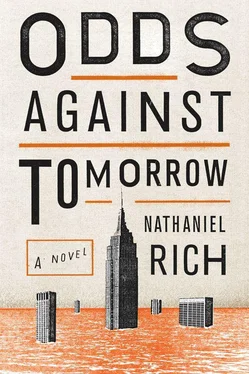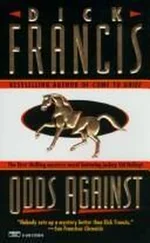“Splendid, no?” said Pam Davenport, grinning like she had annealed the glass herself. “Didn’t I tell you?”
Charnoble had recommended the broker (“top-class all the way,” he had said, blinking). When Mitchell called her, he explained that he wanted something nice. After all, he owed it to himself. His commissions at FutureWorld were increasing considerably, and he’d been there only two months. He wanted to make a broad gesture. He had tried to make one a week earlier, when he sent his parents a check for five thousand dollars.
“What is this?” said Tibor. Mitchell could tell from the way his parents raised their voices that they were standing hunched over the phone.
“This is dopey,” said Rikki.
“I have more than I can use.”
“It’s wonderful you’re making this money, but you should hold on to it. You’re too young to be parting with your salary.”
“Here’s the thing,” said Tibor. “You never know when you might need this. You never know anything.”
“I just thought you guys might need it.”
“We don’t need your money!” shouted Tibor.
“Maybe,” said Rikki in her most gentle tone, “you could figure out a better use for it. Like finding a new apartment.”
She was right. When he first saw his current apartment, it had struck him as oddly familiar. He had found comfort in the lack of natural light, the stucco walls smudged with grease, and the pathetic meagerness of the kitchenette, its stained Formica and tin sink. When he e-mailed photographs to his mother, she was able to explain why this was.
“You moved into a Zukorminium?” she wrote.
This was not the only fact that had recently become clear to him. He had spent months, for instance, trying to distill from Elsa’s letters some kind of general philosophy of fear avoidance that he could appropriate. Her achievement was incredible to him. She had to know the numbers: a person who has suffered a Brugada episode has a ninety percent chance of having another one. The chance that she would die from a Brugada episode was eminently reasonable. It was eminently imminent.
Early one morning, in an effort to exterminate a particularly virulent posse of cockroaches, Mitchell had done the dreadful calculation. It could be reduced to a single number: 1 in 53, or 1.89 percent. These were the odds that a Brugada patient who had already had multiple syncopes would have a fatal attack in the coming year. That was exponentially more likely than the odds of dying from drug or alcohol abuse (1 in 10,837) or an accidental injury (1 in 2,454). There was no mathematical analysis that could make that 1 in 53 less frightening. When you broadened the time frame, the numbers only became uglier. The odds of a fatal syncope in two years: 3.7 percent; in five: 8.7 percent; by the time she turned thirty: 13.2 percent. But Elsa, like curious Sarah Axon in Iowa, seemed oblivious to fear. To some extent, her trick seemed to lie in a delicate combination of denial and distraction. She did this mainly by focusing on pragmatic matters, on hard labor. But all her talk of sowing, plowing, and installing photovoltaic cells seemed to be the manifestation of a larger philosophical strategy. If he could only isolate this strategy, he might be able to use it himself. This was what he was trying to get at in his letters. It wasn’t easy; he couldn’t just ask her How do you overcome your fear of imminent death? Can you teach me? The difficulty wasn’t that these questions would be embarrassing or cross some line of decency. They would , of course, but he held back for a different reason: he was afraid that Elsa might reveal herself to be less carefree than she appeared. That she might say something truly horrifying like What do you mean? I’m terrified! I’m paralyzed with panic. I can barely get out of bed. I keep my hand on my heart at all times in the crazy hope that I’ll be able to feel it beating funny and act before it’s too late. So instead Mitchell had to get at the answer through swipes and squints and intuition. His mission was made more challenging by the fact that Elsa rarely took a serious tone and flitted around from subject to subject. It was like trying to steal the trick of camouflage from a butterfly.
“Spalike,” said Pam Davenport, who had led him into the bathroom. “The bathtub is Kohler.”
Mitchell nodded. “Colder than what?”
He caught his image in the fog-proof mirror above the sink. He had the subtracted look of an automaton or mannequin. Very well — it was to be expected. Something had been subtracted. FutureWorld was working. Not merely as a business but as a treatment. It was better than any mood drug he’d ever taken — and he had tried them all, but none for very long, out of fear that they might mangle his synapses. FutureWorld was more focusing than Adderall, more calming than Ativan, more elating than Klonopin. It was a better soporific than Sonata. The only negative side effects were fatigue and nausea. And those he had already.
His research alerted him to countless new worst-case scenarios, but the time and resources afforded him by the job allowed him to undermine each scenario with rigorous precision. He could exactly determine, for instance, the likelihood that New York’s water supply would evaporate in the next year (impossible), or that an earthquake would dissever Manhattan at 125th Street (exceedingly unlikely). An astronomer at NASA’s Near-Earth Object Program Office at the Jet Propulsion Laboratory in Pasadena explained patiently to him that the odds of an asteroid crashing into the earth and unleashing a new dark age was on the order of ten to the minus eighth power per year, and one in a million in the next century. This number was further mitigated by the odds that human civilization would figure out a way to block an asteroid by the time one arrived. The asteroid scenario was not going to happen. But if a giant rock did come close to hitting Earth, Mitchell knew exactly which aerospace and defense companies would profit.
So it was a dream job — it quelled his nightmares. One by one the fears were dissipating. Even figuring out Elsa’s golden secret was beginning to seem less important to him. He was starting to suspect that she had no secret. She may have convinced herself that she started the farm for altruistic, utopian reasons, but the truth of the matter, he now believed, was that Ticonderoga had been designed as a fortress. She had locked herself away from cardiologists and hospital beds, from a life lived in perpetual uncertainty. At Ticonderoga she could control every aspect of her existence — the food, the energy, the people. At least that’s how she tried to play it off. In fact she had only created the illusion of control. The whole thing was so clear, so logical, he was amazed she hadn’t seen her own behavior for what it was. She was either in denial or terror stricken. Either way, she was trapped.
Mitchell, on the other hand — Mitchell was free! Thanks to FutureWorld, thanks to Alec Charnoble, the old strictures were coming undone. Take, for instance, this situation with the drought. Elsa had written again to tell him how bad it was up on the farm. The tomatoes were exploding on the vine, the corn tasted burned. Her entire utopian fantasy was on the verge of shriveling up. There was a note of despair in her letters — which, by the way, had been coming less frequently. In fact, it had been something like three or four days since he’d heard from her. It made sense, this reluctance to write. It was becoming clear that it was simply unrealistic for a bunch of college kids without any agricultural expertise, or even experience, to start a farm. Unrealistic? “Insane” was a better word.
Nor was Mitchell concerned about the drought. In the past he would have turned, frantically, to his research, calculating the odds that the water scarcity might bring about a disruption in the food supply, a hoarding of goods, rapid inflation. It’s true that the water table numbers weren’t promising, but that was hardly remarkable. Nearly three billion people on the planet lived in water-stressed regions, places of continual drought. He did the research as always, but now he used the numbers as a salesman would — to recruit new clients, to catalyze their fears. It had become a game to him. FutureWorld had transformed him from a neurotic paranoid into something much stronger, more powerful: a businessman. To prove this to himself, he had called Pam Davenport and asked to see her finest apartments.
Читать дальше












